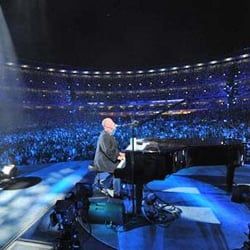Tribeca Review: Last Play At Shea

On July 18th, 2008, a stage was erected in the middle of New York’s Shea Stadium for what would be the last concert before the building was demolished in favor of the newer Citi Field that was being built right next door. The headliner was native Long Islander Billy Joel, who was first inspired to become a musician after seeing The Beatles play the exact same venue back in 1965 when the building was still new. Director Paul Crowder was there to capture the event, and with that footage and a full and rich history behind both Joel and Shea, he has created a fantastic documentary in Last Play at Shea.
Part music documentary, part concert film, and part sports documentary, the film really shouldn’t work. With so much history behind both the music legend and the New York’s “other” team, there is enough to make two completely separate films of equal length. With a runtime of only 95 minutes, it’s inconceivable that they would be able to get everything in there, but the truth is that they didn’t miss a single thing. Using the concert footage as a soundtrack and a disturbingly parallel timeline of both subjects, the film is a beautiful love letter to the musician that brought us “Piano Man” and the building that Mets fans affectionately call “a dump” (but it’s their dump).
Though Shea only came down only a little more than a year ago, the film sets a level of nostalgia that makes you feel like the coliseum was something that belonged to our grandfather’s generation. Narrated by Alec Baldwin and featuring interviews with Mets superstars like Keith Hernandez, Mike Piazza, Tom Seaver and Daryl Strawberry, every important moment from the stadium’s 44 year history, from the miraculous World Series run in 1969 (complete with black cat cursing the Cubs), to the first baseball game in New York after the events of September 11th is covered. The sections following the team and the stadium are funny, poignant and something anyone can enjoy, regardless of their feelings about the team or the sport.
The documentary also does an incredible job of capturing the life of Joel as he grew up in Long Island through his rise in the music industry. One of the cooler things that Crowder does is use his final Shea performance to move the narrative, playing “Moving Out” went he travels cross country to live in Los Angeles and “Piano Man” while working as a lounge pianist. Like any musician’s story, there are the good times and the bad times, his songs getting their first time on the airwaves and the discovery that his manager has pissed all of Joel’s money away, but it never feels like VH1’s Behind The Music, largely because of how it's broken up with the concert footage and the story of the stadium.
The Tribeca Film Festival, the largest festival held in New York was the only place where this film could have been premiered. Both Joel and the Mets are such icons in this city and the film does as much to honor its two subjects as it does the five boroughs. As a die-hard Mets fan and a long admirer of Billy Joel’s music, it’s more than likely that I got something out of this documentary that a lot of people won’t, but it is so well made that I truly don’t think that it matters.
Follow along with all of our special, Tribeca 2010 coverage right here.
CINEMABLEND NEWSLETTER
Your Daily Blend of Entertainment News

Eric Eisenberg is the Assistant Managing Editor at CinemaBlend. After graduating Boston University and earning a bachelor’s degree in journalism, he took a part-time job as a staff writer for CinemaBlend, and after six months was offered the opportunity to move to Los Angeles and take on a newly created West Coast Editor position. Over a decade later, he's continuing to advance his interests and expertise. In addition to conducting filmmaker interviews and contributing to the news and feature content of the site, Eric also oversees the Movie Reviews section, writes the the weekend box office report (published Sundays), and is the site's resident Stephen King expert. He has two King-related columns.
Most Popular






